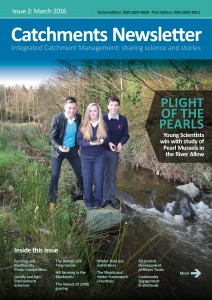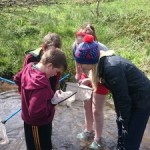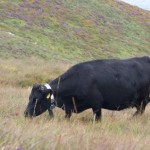The River Loobagh is a tributary of the River Maigue…
“Plight of the Pearls”- Young Scientists look at Pearl Mussels in the River Allow
This January, my project partner Riona Sheahan and I entered and displayed a project at the 52nd annual BT Young Scientist and Technology Exhibition, 2016, held in the RDS in Dublin. Our project, entitled the “Plight of the Pearls”, investigated the factors that affect the distribution of the freshwater pearl mussel along the River Allow, a tributary of the River Blackwater in North County Cork. Of the factors that we investigated where mussels were present, we found that substrate size and siltation were the two factors that affected their distribution; depth of the water, distance of the mussels from the river bank, macro-habitat type, pH and temperature values and light intensity were all found not to have a significant impact. Total absence of pearl mussels in certain locations was associated with pollution discharges. Our project won the 3rd prize in the Biological and Ecological Sciences, Intermediate (Group), category, a major achievement for us and something we hope will contribute in a meaningful way to the saving of the pearl mussel.

We first came across the freshwater pearl mussel in primary school. Dr Fran Igoe came to our schools to talk about our river and this was our first exposure to the species. Opting to work with Fran and the LIFE+ team for our project was an easy decision as not only was the mussel something of relevance to us as local people, a fact highlighted to us by the LIFE+ Project’s visit. We are extremely grateful to Fran Igoe, John Ballinger and Nuala Riordan for their assistance and advice during our project and our science teacher Mr Derry O’Donovan.
At the exhibition itself, we met many members of the public who had either never heard of the pearl mussel or who only had scant information regarding the species. We were delighted to get the opportunity to talk to these people about the mussels and to explain to them how important it is that we conserve them in rivers where they remain. The awareness we raised through the undertaking of the project among our fellow students, our families, our friends and indeed members of the wider community was something we were delighted and we found that, while people might not have heard of the mussels before, they were delighted to learn about them and listened with interest.
We intend to enter our project into the ECO-UNESCO Young Environmentalist’s Awards at the end of February. This will bring further awareness to the “plight of the pearls” and we hope that all our work will make a difference in this area.
Article by Darragh O’Keeffe, Transition Year Student, Colaiste Treasa, Kanturk, Cork.








